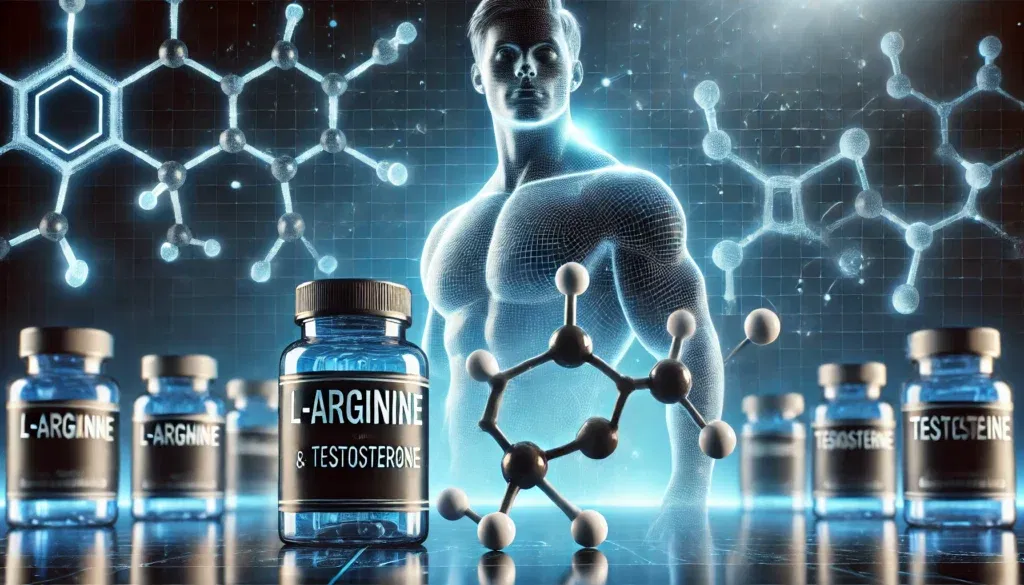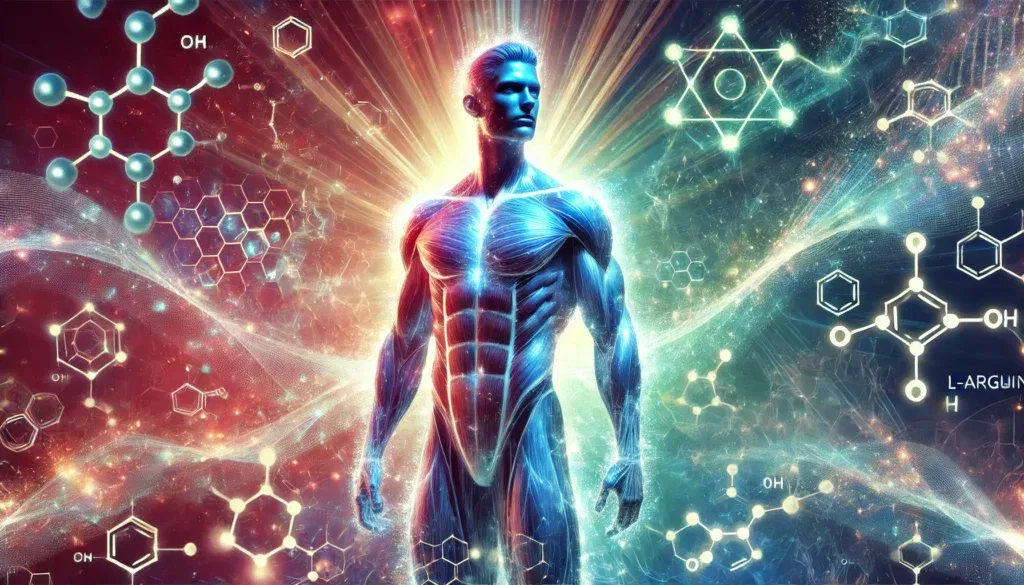L-Arginine has gained significant attention in the world of men’s health, particularly concerning its potential effects on testosterone levels. This amino acid, known for its role in nitric oxide production, has been widely marketed as a supplement for improving blood flow, supporting muscle growth, and enhancing overall vitality. But does L-Arginine increase testosterone levels, or is its reputation based more on marketing than science? To answer this question, we must delve into the scientific research surrounding L-Arginine and its impact on testosterone production, hormonal balance, and overall male health.
You may also like: How to Increase Testosterone Levels Naturally: Science-Backed Strategies for Men’s Health & Longevity
Understanding L-Arginine: A Crucial Amino Acid
L-Arginine is a semi-essential amino acid that plays a critical role in various physiological processes, including immune function, cardiovascular health, and muscle metabolism. It serves as a precursor to nitric oxide, a molecule that promotes vasodilation, which helps improve blood circulation. Because of this, L-Arginine has been extensively studied for its effects on athletic performance, erectile function, and cardiovascular health. However, its role in testosterone production remains a topic of ongoing research and debate.
The body can synthesize L-Arginine, but dietary sources, including meat, fish, dairy products, and nuts, contribute significantly to maintaining optimal levels. Supplementation is often recommended for individuals seeking to enhance their physical performance, improve sexual health, or support muscle recovery. But despite its known benefits, the question remains: does L-Arginine boost testosterone levels in men?

The Relationship Between L-Arginine and Testosterone
Testosterone is the primary male sex hormone responsible for regulating muscle growth, fat distribution, libido, and overall energy levels. Many factors influence testosterone production, including age, diet, exercise, sleep, and overall health. Some studies suggest that amino acids, including L-Arginine, may play a role in supporting hormonal balance. However, the direct impact of L-Arginine on testosterone remains uncertain.
One of the main mechanisms through which L-Arginine might influence testosterone is by enhancing blood flow and oxygen delivery to the testes, where testosterone is produced. Increased circulation could theoretically support Leydig cell function, which is responsible for testosterone synthesis. Additionally, L-Arginine is involved in protein metabolism, which is essential for muscle growth and repair—both of which are indirectly linked to testosterone levels.
Despite these potential mechanisms, the scientific literature offers mixed results regarding L-Arginine’s direct effect on testosterone production. Some studies indicate that supplementation may support hormonal balance, while others suggest minimal or no impact on testosterone levels. To understand the nuances of these findings, we must examine the existing research in greater detail.
Scientific Studies on L-Arginine and Testosterone Levels
Several studies have investigated the relationship between L-Arginine supplementation and testosterone levels, yielding varying conclusions. One study published in the Journal of Nutrition explored the effects of dietary L-Arginine on anabolic hormone responses in healthy individuals. Researchers found that while L-Arginine contributed to increased nitric oxide production, its impact on testosterone levels was not statistically significant.
Conversely, another study published in Andrologia examined the effects of L-Arginine in combination with other amino acids and found a modest increase in testosterone levels among participants. Researchers hypothesized that the improvement in blood flow and oxygenation may have contributed to the observed hormonal changes, but they also noted that these effects were more pronounced when L-Arginine was combined with other supportive nutrients such as L-Citrulline and zinc.
Animal studies have also provided some insights into the potential link between L-Arginine and testosterone. Research conducted on rodents demonstrated that L-Arginine supplementation could enhance nitric oxide production and testicular function, potentially leading to increased testosterone synthesis. However, these findings have not been consistently replicated in human trials, making it difficult to draw definitive conclusions.
The Role of Nitric Oxide in Testosterone Production
One of the key reasons L-Arginine is often associated with testosterone production is its role in nitric oxide synthesis. Nitric oxide is a signaling molecule that regulates blood vessel dilation, improving circulation and oxygen delivery to various tissues, including the testes. Since testosterone production occurs in the Leydig cells of the testes, some researchers propose that enhanced blood flow may support optimal hormone synthesis.
While increased nitric oxide levels can contribute to better vascular health and improved erectile function, evidence directly linking this process to significant testosterone boosts remains limited. Most research suggests that while nitric oxide supports overall health and well-being, its impact on testosterone levels is indirect rather than a primary mechanism.
L-Arginine and Athletic Performance: An Indirect Connection?
Another potential link between L-Arginine and testosterone lies in its effects on athletic performance and muscle recovery. Testosterone plays a crucial role in muscle growth, strength, and endurance. Many athletes and bodybuilders supplement with L-Arginine to improve their workout performance, enhance recovery, and reduce muscle fatigue.
A study published in the International Journal of Sports Medicine examined the effects of L-Arginine supplementation on exercise performance. The results indicated that while L-Arginine enhanced nitric oxide production and blood flow, there was no direct correlation with increased testosterone levels. However, researchers noted that improved exercise capacity and muscle recovery might contribute to long-term hormonal balance, indirectly supporting testosterone levels.
Another aspect to consider is that regular resistance training and high-intensity exercise have been shown to naturally boost testosterone levels. If L-Arginine supplementation helps individuals train more effectively and recover faster, it may contribute to maintaining optimal hormonal balance over time.
L-Arginine and Sexual Health: Does It Influence Testosterone?
Erectile function and libido are often closely linked to testosterone levels. Given L-Arginine’s role in promoting nitric oxide production and improving blood flow, it is frequently marketed as a natural remedy for erectile dysfunction and sexual performance enhancement. Some studies suggest that L-Arginine supplementation may improve erectile function, but does this translate to higher testosterone levels?
Research published in the Journal of Sexual Medicine explored the effects of L-Arginine on men with mild erectile dysfunction. The study found that participants who supplemented with L-Arginine experienced improvements in erectile function, but there was no significant change in testosterone levels. This suggests that while L-Arginine may enhance sexual performance by increasing blood flow, it does not necessarily lead to increased testosterone production.
Combining L-Arginine with Other Supplements for Optimal Hormonal Health
Given the mixed findings on L-Arginine’s direct impact on testosterone, some experts recommend combining it with other nutrients that have been more strongly linked to hormone balance. For example, zinc, magnesium, vitamin D, and D-Aspartic acid have been shown to support testosterone production more directly than L-Arginine alone.
A study published in Biological Trace Element Research highlighted the role of zinc in maintaining healthy testosterone levels. Since zinc is essential for the function of the enzyme responsible for testosterone synthesis, deficiencies in this mineral can lead to hormonal imbalances. Some supplement formulations include both L-Arginine and zinc to provide comprehensive support for men’s health.
Similarly, L-Citrulline, another amino acid involved in nitric oxide production, has been shown to enhance the bioavailability of L-Arginine. Some research suggests that combining L-Citrulline with L-Arginine can improve circulation and exercise performance more effectively than L-Arginine alone. However, the impact on testosterone remains largely speculative.

Frequently Asked Questions (FAQ) About L-Arginine and Testosterone
1. Does L-Arginine Boost Testosterone Naturally?
Yes, L-arginine has been studied for its potential role in boosting testosterone, but its effects are indirect. It primarily enhances nitric oxide production, which improves blood circulation and may support overall hormone health. While some research suggests that increased blood flow to the testes could optimize testosterone production, direct evidence linking L-arginine supplementation to significantly higher testosterone levels is limited. However, when combined with other key nutrients like zinc, vitamin D, and D-aspartic acid, L-arginine may contribute to a more favorable hormonal balance. Consistent exercise, a healthy diet, and proper supplementation can enhance the benefits of L-arginine for testosterone levels.
2. How Does Arginine and Testosterone Interact in the Body?
L-arginine plays a crucial role in nitric oxide synthesis, which is essential for vascular health and blood flow. This improved circulation can indirectly support testosterone production by ensuring that the testes receive sufficient oxygen and nutrients. Additionally, better blood flow can enhance erectile function, which is often linked to healthy testosterone levels. Some studies also suggest that L-arginine might help mitigate oxidative stress in Leydig cells, which are responsible for testosterone production. While arginine alone may not drastically increase testosterone, it plays a supportive role in a well-rounded approach to hormonal health.
3. Does L-Arginine Increase Testosterone More Effectively When Combined with Other Supplements?
Yes, L-arginine may be more effective in boosting testosterone when combined with other scientifically backed supplements. Research suggests that stacking L-arginine with compounds like D-aspartic acid, fenugreek extract, and zinc may have a greater impact on testosterone levels. These ingredients work synergistically to support the hypothalamic-pituitary-gonadal (HPG) axis, which regulates hormone production. Additionally, proper protein intake and resistance training further enhance testosterone synthesis, making supplementation more effective. A holistic approach incorporating diet, exercise, and supplementation yields the best results.
4. Can L-Arginine Help With Testosterone-Related Issues Like Low Libido?
Yes, one of the most well-documented benefits of L-arginine is its ability to improve blood flow, which directly impacts libido and sexual performance. Testosterone plays a vital role in libido, and while L-arginine may not significantly raise testosterone levels on its own, it can improve symptoms associated with low testosterone. By enhancing nitric oxide production, L-arginine supports erectile function, making it a valuable supplement for men experiencing low libido. Combining L-arginine with lifestyle changes such as exercise and stress management can further enhance sexual health. If low testosterone persists, professional medical advice is recommended.
5. Does Arginine Increase Testosterone in Aging Men?
As men age, natural testosterone levels decline, leading to symptoms like fatigue, reduced muscle mass, and lower libido. While L-arginine alone may not dramatically increase testosterone, it can support overall vascular health and nitric oxide production, which are beneficial for aging men. Improved blood circulation can enhance oxygen delivery to tissues, potentially optimizing testosterone production. Additionally, L-arginine’s role in protein metabolism may support muscle maintenance, which is important for older men looking to preserve strength and hormonal balance. A combination of resistance training, proper nutrition, and targeted supplementation can help counteract age-related testosterone decline.
6. How Long Does It Take for L-Arginine to Affect Testosterone Levels?
The effects of L-arginine on testosterone, if any, are typically gradual and depend on multiple factors such as dosage, diet, and lifestyle. Some users report improved energy and circulation within a few days to weeks, but noticeable changes in testosterone levels may take longer. Since L-arginine supports nitric oxide production rather than directly increasing testosterone, the benefits are often subtle. Consistency is key—regular supplementation over several months, combined with exercise and proper nutrition, is more likely to yield results. Tracking hormone levels through blood tests can help assess long-term changes.
7. Does L-Arginine Boost Testosterone More in Active Individuals?
Yes, physically active individuals may experience greater benefits from L-arginine supplementation in terms of testosterone support. Exercise, particularly resistance training and high-intensity workouts, naturally boosts testosterone production. L-arginine’s ability to enhance nitric oxide production can improve blood flow to muscles, potentially enhancing workout performance and recovery. This, in turn, can contribute to increased testosterone synthesis due to the anabolic effects of strength training. Combining L-arginine with a structured exercise regimen is the best approach for maximizing its potential benefits.
8. Are There Any Risks of Taking L-Arginine for Testosterone Support?
L-arginine is generally considered safe when taken in recommended doses, but excessive intake may cause side effects such as stomach discomfort, bloating, or lowered blood pressure. Since L-arginine can enhance nitric oxide production, individuals with pre-existing cardiovascular conditions or those taking blood pressure medications should consult a doctor before use. Additionally, while L-arginine supports vascular health, relying solely on it to boost testosterone may lead to unmet expectations. A balanced approach that includes proper nutrition, exercise, and regular medical check-ups ensures safe and effective use.
9. Does L-Arginine Increase Testosterone More Effectively in Certain Diets?
Diet plays a crucial role in how L-arginine affects testosterone levels. A diet rich in healthy fats, lean proteins, and micronutrients like zinc and magnesium enhances testosterone synthesis. Since L-arginine is found in protein-rich foods like meat, fish, nuts, and dairy, individuals following a protein-deficient diet may benefit more from supplementation. Additionally, reducing processed foods and excessive sugar intake can support hormonal balance, making L-arginine supplementation more effective. Personalized nutrition strategies tailored to an individual’s needs yield the best results.
10. What Is the Optimal Dosage of L-Arginine for Testosterone Benefits?
The optimal dosage of L-arginine for testosterone support varies depending on individual health status, dietary intake, and exercise regimen. Most studies suggest that doses between 3 to 6 grams per day can effectively enhance nitric oxide production and circulation. However, to potentially influence testosterone levels, higher doses (8-10 grams) in divided servings may be required. It’s best to start with a lower dose to assess tolerance before gradually increasing intake. Consulting a healthcare professional for personalized dosage recommendations ensures both safety and effectiveness.

Conclusion: Does L-Arginine Boost Testosterone?
After reviewing the available scientific literature, it becomes clear that L-Arginine does not directly boost testosterone levels in a significant way. While it plays a crucial role in nitric oxide production, circulation, and muscle recovery, its effects on hormonal balance appear to be indirect rather than a primary mechanism. Individuals seeking to optimize their testosterone levels may benefit more from focusing on resistance training, proper nutrition, and supplementation with nutrients that have a stronger evidence base for supporting testosterone production.
For those looking to improve overall health, L-Arginine remains a valuable supplement for cardiovascular function, muscle performance, and sexual health. However, expecting substantial increases in testosterone solely from L-Arginine supplementation may lead to disappointment. A well-rounded approach, including exercise, stress management, and a nutrient-rich diet, remains the most effective strategy for maintaining optimal testosterone levels and overall male vitality.
testosterone boosting supplements, nitric oxide and hormone health, muscle growth and testosterone, amino acids for men’s health, best supplements for testosterone, natural ways to increase testosterone, L-Arginine benefits for men, nitric oxide and blood flow, workout supplements for muscle growth, exercise and hormone balance, male vitality and performance, testosterone and sexual health, natural remedies for low testosterone, arginine vs citrulline for testosterone, best natural testosterone boosters, resistance training and hormones, cardiovascular health and testosterone, how to increase testosterone naturally, supplement combinations for men’s health, optimizing male hormones
Further Reading:
The benefits and side effects of L-arginine
Hormonal response to L-arginine supplementation in physically active individuals
Disclaimer: The information provided in this article is for general informational purposes only. The content does not constitute professional advice of any kind, including but not limited to medical, legal, or financial advice. HisHealthMag and its contributors make no representations or warranties regarding the accuracy, completeness, or reliability of the information presented. Always seek the advice of a qualified professional for any specific concerns or questions you may have. Neither HisHealthMag nor its authors assume any responsibility or liability for any actions taken based on the information provided in this article. The views and opinions expressed are those of the author(s) and do not necessarily reflect the official policy or position of HisHealthMag.





